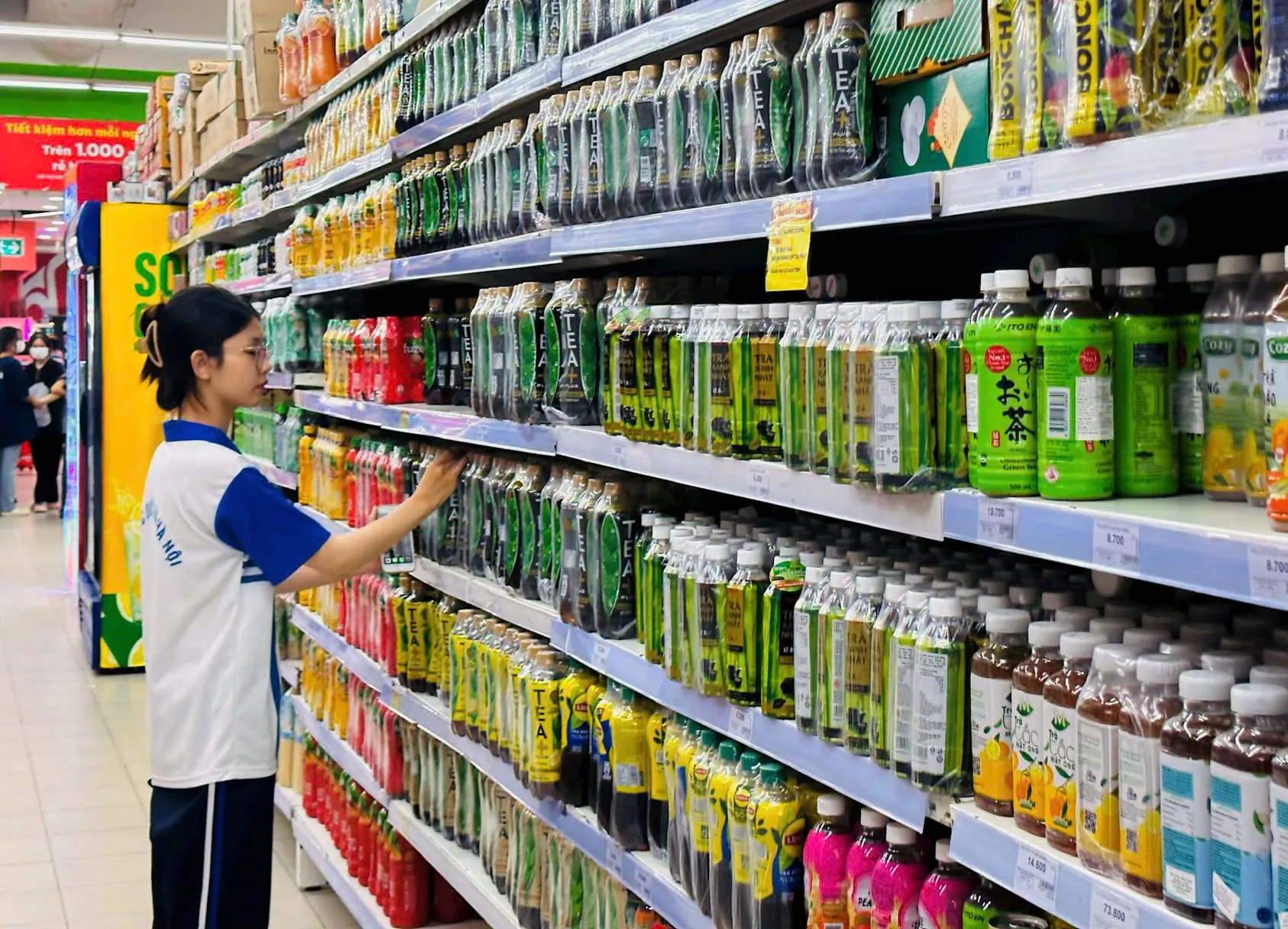Beverage producers seek delay of new special consumption tax
Beverage producers worry about possible hit by upcoming special consumption tax law.
Beverage companies in Vietnam have called on the government to delay or reconsider the imposition of a 10% special consumption tax on sugar-sweetened beverages, warning of negative effects on the economy and businesses.

Beverage products sold at GO! Thang Long shopping center. Photo: Hoai Nam/The Hanoi Times
The proposed tax is part of the revised Law on Special Consumption Tax, which was discussed at the National Assembly meeting in November 2024 and is expected to be approved by the legislative body in May.
Under the draft, the tax would apply to beverages containing more than 5g of sugar per 100ml, based on the Vietnamese national standards (TCVN).
The draft provision is based on recommendations from the World Health Organization (WHO), UNICEF, and the Vietnamese Ministry of Health. It aims to protect public health by reducing childhood obesity and related health problems.
Nguyen Duy Hung, Chairman of the Tan Hiep Phat Group's business relations and law division, said the company's products are distributed via 700,000 outlets and 2.4 million households, all of whom will be affected by the new tax.
After three years of suffering from the Covid-19 pandemic, local businesses are recovering and need all kinds of support, not new financial burdens, he said.
"The new tariff policy under US President Donald Trump could pose additional challenges for Vietnamese businesses," said Hung.
Vietnam needs appropriate solutions to avoid compromising this year's growth target of over 8%.
Nguyen Minh Duc, an economist with the Vietnam Chamber of Commerce and Industry (VCCI), said Vietnam's economy remains fragile and a sugar tax could hurt demand and slow growth.
The member of the US-ASEAN Business Council emphasized that tax reform must balance fiscal needs with economic incentives. "A sudden tax hike could reduce purchasing power, disrupt businesses, and affect investment," said Duc.
He suggested delaying the tax until January 1, 2028, and starting at 5% instead of 10%.
Nguyen Van Viet, Chairman of the Vietnam Beer-Alcohol-Beverage Association (VBA), said the beverage industry makes a significant contribution to the economy.
He urged lawmakers to carefully consider the potential impacts.
"We hope that sugar-sweetened beverages will not be taxed immediately. If legislation is passed, a phased-in plan should be adopted to minimize the harm to businesses," Viet said.
Nguyen Thi Cuc, Chairwoman of the Vietnam Association of Tax Consultants, agreed that all tax policies should balance economic, health, and social goals.
She called for the law to be postponed and for more research to be conducted to ensure its effectiveness.
Rational clarifications needed
Critics have also questioned the scientific basis for the 10% tax. Some argue that the link between sugar-sweetened beverages and obesity in Vietnamese children is unclear and unreasonable.
Nguyen Quang Dung, Head of the Department of Nutrition and Food Safety at Hanoi Medical University, listed six causes of childhood obesity: diet, lack of exercise, genetics, socioeconomic factors, sleep deprivation, and early malnutrition.
Sugar-sweetened beverages are not the only or main cause of obesity and the rate in Vietnam remains relatively low.
According to Dung, the obesity rate for children aged 5-19 is 26.8% in cities and 18.3% in rural areas. It is worth noting that children in urban areas, where obesity rates are higher, consume less sugar-sweetened beverages than children in rural areas. On average, 18.3% of children in Vietnam are overweight, compared to 33.96% in ASEAN.
He also pointed out that sugary drinks contain only 42 kcal per 100g - much less than ice cream or candy.
"Obesity is increasing but remains under control, and Vietnam's overweight rate is among the lowest in Southeast Asia and the world," he said.
Nguyen Quoc Viet, a public policy expert at the University of Economics, noted that younger consumers prefer milk tea and other liquid nutritional products to traditional soft drinks.
He said sugar-sweetened beverages are not the main cause of obesity, as rural children consume more sugar-sweetened beverages but are less obese than urban children.
Taxing sugary drinks alone is unlikely to reduce obesity and could lead consumers to turn to unregulated and potentially unsafe alternatives, Viet said.
Meanwhile, Chu Thi Van Anh, Vice Chairwoman and General Secretary of the VBA, said the drafters of the law lacked a full assessment of the tax's impact in their explanatory documents.
Experts have also raised concerns that the tax will not effectively reduce obesity or shape consumer behaviors, and may contravene principles of tax fairness.
Duong Dinh Giam, Chairman of the Vietnam Consumer Protection Association, said that making sugary drinks the sole culprit could lead the public to ignore other high-sugar foods such as cakes, cookies, and milk tea.
"Sugary drinks are not only a refreshment but also a source of energy, especially for workers in rural areas. Taxing these drinks could violate consumers' rights, while its health benefits are vague," he said.
Giam said the law should be supported by research showing that sugary drinks are the main cause of obesity. If so, taxation may be justified - but only with a clear transition period.
He said Consumers need time to switch to the so-called healthier options. Otherwise, they may turn to cheap, unregulated products that could pose new health risks.
More importantly, delaying the tax would also give businesses time to invest in technology and adjust production to avoid sudden shocks.








